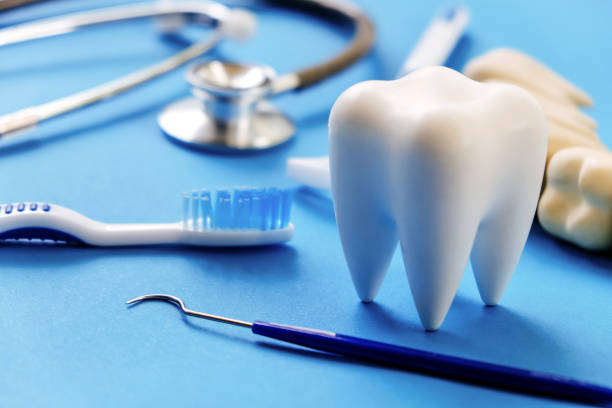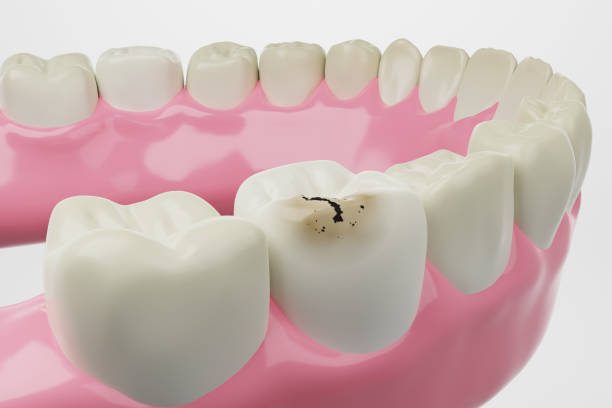
June 27, 2024

Molars play a crucial role in our ability to chew and process food efficiently. Understanding when these essential teeth come in and how to care for them throughout life is vital for maintaining good oral health.
In this comprehensive guide by Pleasanton Dental Care, we'll explore everything you need to know about molar eruption and development.
Molars are large, flat teeth located at the back of the mouth. Their primary function is to grind and crush food, making it easier to swallow and digest.
Molars have a broader surface area compared to other teeth, allowing them to handle the heavy-duty task of breaking down food particles.
Molars are essential for proper chewing and digestion. They work in tandem with other teeth to break down food into smaller, more manageable pieces. This process plays a crucial role in facilitating easy swallowing and proper digestion, thereby enhancing overall health and nutrition.
The first set of baby molars, also known as primary molars, typically erupt between the ages of 12 and 18 months. These molars emerge as part of a baby's primary teeth and are critical for chewing solid foods as the child transitions from a milk-based diet.
Teething can be an uncomfortable experience for babies, and the eruption of molars is no exception. Common symptoms include:
To alleviate teething discomfort, parents can try the following methods:
The second set of baby molars typically appears between the ages of 20 and 30 months. These molars are the last of the primary teeth to erupt, completing the full set of 20 baby teeth.
The primary difference between the first and second baby molars is their eruption timeline. The first molars appear around the first year, while the second molars come in closer to the third year. Additionally, the second molars are located further back in the mouth, behind the first molars.
Permanent molars begin to emerge around the age of six and continue to develop through the teenage years. These teeth replace the primary molars and are essential for lifelong oral health.
The first permanent molars, also known as 6-year molars, typically erupt around the age of six. They emerge behind the last primary teeth and are the first set of permanent teeth to appear.
During the same period, the central and lateral incisors come in, replacing the primary incisors. This stage marks the beginning of significant changes in a child's dental structure.
The canine teeth, which are crucial for tearing food, erupt between the ages of 9 and 13. These teeth are sharper and more pointed compared to other teeth.
Premolars, also known as bicuspids, replace the primary molars. These teeth have a flatter surface, ideal for crushing and grinding food. They typically erupt between the ages of 9 and 13.
The second permanent molars, which appear between the ages of 11 and 13, are located behind the first permanent molars. They are crucial for maintaining proper tooth alignment and spacing.
The third molars, commonly known as wisdom teeth, usually erupt between the ages of 17 and 21. However, not everyone develops wisdom teeth, and in some cases, these teeth can become impacted, leading to potential complications and necessitating removal.
Several factors can influence the timing of molar eruption, including genetics, nutrition, and underlying medical conditions.
Genetic factors play a significant role in determining when molars and other teeth erupt. If a child's parents experienced early or late teething, the child might follow a similar pattern.
A well-balanced diet rich in essential vitamins and minerals supports healthy tooth development. Nutritional deficiencies can delay the eruption of teeth, including molars.
Certain medical conditions, such as hormonal imbalances or developmental disorders, can affect the timing of molar eruption. Consulting with a dentist or pediatrician can help address any concerns related to delayed teething.
It's important to monitor your child's dental development. If molars or other teeth erupt significantly earlier or later than the typical age range, it may be advisable to consult a dentist. Early intervention can address potential issues and ensure healthy oral development.
Proper oral hygiene is crucial for maintaining healthy molars throughout their lifespan. Brushing both baby and permanent molars thoroughly twice a day with fluoride toothpaste is essential.
Daily flossing helps remove food particles and plaque from between the teeth, preventing cavities and gum disease.
Molars, like other teeth, can be susceptible to various developmental issues, including cavities, misalignment, and impaction. Regular dental checkups are essential for early detection and treatment of these problems.
Regular dental checkups are vital for monitoring the health of molars. Dentists can identify potential issues early on, provide professional cleanings, and offer guidance on maintaining optimal oral hygiene.
A diet rich in calcium, phosphorus, and vitamin D supports strong teeth and bones. Limiting sugary snacks and beverages can help prevent cavities and other dental problems.
Invisalign is a popular option for discreetly straightening teeth. The clear aligners gradually shift your teeth into the desired position, and sometimes orthodontic treatment is suggested as the final teeth come in to help them settle into the correct places. Treatment typically takes 12 to 18 months to complete, but it can vary depending on the complexity of your individual case.
Molars are prone to cavities due to their location and the grooves on their surface, which can trap food particles. Overcrowding can also occur, especially if wisdom teeth do not have enough space to erupt properly. Regular dental visits can help manage these issues effectively.
Not everyone develops wisdom teeth, and for those who do, the eruption can vary significantly. Some people may have all four wisdom teeth, while others may have fewer or none at all.
Common signs of wisdom teeth eruption include:
Impacted wisdom teeth can cause several complications, including:
Wisdom teeth removal is often recommended if the teeth are impacted, causing pain or posing a risk to adjacent teeth. A dentist or oral surgeon can evaluate the situation and determine the best course of action.
Welcome to Pleasanton Dental Care, where your oral health is our top priority. With over a decade of dedicated service, we blend premium materials, advanced technology, and a compassionate approach to deliver exceptional dental care.
Serving Pleasanton and the surrounding areas, our warm, family-like atmosphere ensures you feel valued and cared for during every visit.
Experience top-tier dental services at Pleasanton Dental Care. Our compassionate team, premium materials, and cutting-edge technology ensure excellence at every visit.
Trust a decade of dedicated service for your best smile and experience the Pleasanton Dental Care difference today.

Caring for the molars is crucial for overall oral health. Knowing when molars will come in, maintaining proper hygiene, and seeking regular dental care are all essential for keeping them healthy.
Early detection and intervention can prevent issues like cavities, misalignment, and impaction. Additionally, a balanced diet and effective brushing and flossing contribute significantly to tooth health.
At Pleasanton Dental Care, your oral health is our priority. Our warm, family-like atmosphere ensures you and your loved ones receive the best care. Trust Pleasanton Dental Care for a healthy, beautiful smile.
Take the first step towards a healthier, brighter smile! Schedule your personalized dental appointment now and experience top-notch care from our dedicated team. Your journey to optimal oral health begins here.
BOOK APPOINTMENT